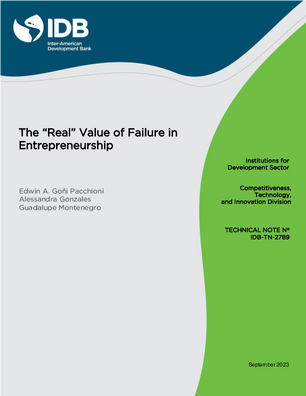The “Real” Value of Failure in Entrepreneurship
Date
Sep 2023
Evidence about the effectiveness of entrepreneurship public programs in Latin America on beneficiary startups across the region has shown average positive impacts on survival rates, attraction of investments, sales, profits, hiring, wages paid, taxes paid, etc. Yet, for those beneficiaries whose startups fail to succeed under these metrics (either due to failure to launch or failure to survive and grow), there is a commonly accepted notion that such a failure brings in social value as the likelihood of founding future successful startups should increase after learning from failure. This paper empirically addresses this contention by exploiting two datasets of administrative records from Brazil: the registry of firms (Cadastro), which identifies founders of firms, and the payroll administrative records (RAIS), which provide longitudinal information on characteristics of employers and employees for all formal firms in the country. By tracing the founding history of serial founders and after controlling for several characteristics of the founders and their businesses, we find that serial founders whose previous startups reach the top quintiles of the productivity distribution (whether or not these previous startups exited the market) are more likely to establish successful startups in subsequent ventures. Conversely, founders whose previous startups belong to the lower quintiles of the productivity distribution (whether these previous startups exited the market or not) tend to continue founding unsuccessful startups. These findings validate the theory of learning after serial founding, but only in those cases where failure happens after previous ventures have reached an intermediate stage of productivity progress among top-tier startups. Failure is an absorbing state for founders who repeatedly found bottom-tier startups, and therefore, public funding should consider this aspect both in the selection of prospective beneficiaries and in the ex post social valuation of beneficiaries that fail to startup or grow.




